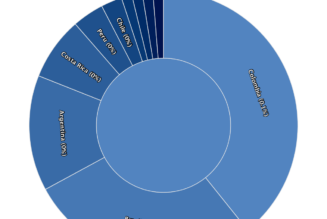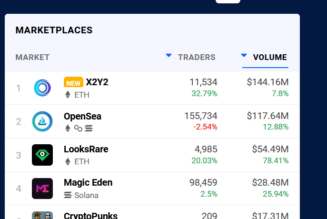
Decentralization via blockchain technology has given rise to several applications, including cryptocurrency, nonfungible tokens, decentralized autonomous organizations, decentralized finance and much more. However, the future of decentralization may very well extend beyond blockchain technology.
Nillion, an internet infrastructure platform based on cryptography, has developed a technology called Nil Message Compute (NMC), which changes how data is stored, processed and decentralized. This new technology could have important implications for how companies and users pursue decentralization as an ethos.
When asked how decentralization without blockchains was possible, Nillion CEO Alex Page explained how NMC-basedtechnology takes arbitrary data, transforms and fragments it, and then distributes the resulting particles across a network of nodes.
“The nodes can store the particles or run computations with the fragments of data without sending messages between themselves, and return the results to the desired end-point for reconstruction (without relying on trusted hardware),” Page explained to Cointelegraph. “Throughout the whole process, nodes are blind to whatever they are processing, yet are able to run computations at speeds that in many cases are significantly faster than its predecessor technology, [multi-party computation, or MPC].”
He further explained the difference between his platform’s NPC technology and its MPC predecessor:
“Traditional MPC systems typically require messaging between the nodes, which dramatically slows down computation speeds. NMC has removed this throttle allowing for scalable fast computation. The result is a decentralized, non-blockchain network of nodes which can run secure, private computations extremely efficiently that opens up new, non-blockchain use cases. “
Speaking on the future of decentralization, Page shared that decentralization will be a fundamental part of the future digital world because humanity has reached a point where data — notably, the control of data — has become a significant part of our lives:
“The future of decentralization will continue to expand through the adoption of technologies that bring new utility and functionality to blockchain — for example, through zero-knowledge/succinctness proofs, threshold commitments and now NMC — to expand the capabilities beyond just recording transactions on a public ledger.”
The CEO also emphasized that “decentralization is a spectrum with multiple axes,” adding, “Decentralization will include blockchain as a foundational element, but other technologies will expand the potential in new ways that blockchain was never designed to do.”
When it comes to the advantages and benefits of decentralization without using blockchain technology, Miguel de Vega, the chief scientist at Nillion, spoke about how NMC technology does not need to be synchronized with the production of blocks, or depend on the completion of a computation for inclusion into a block, for consensus to take place, as is the case with traditional blockchain.
“Instead, it can run right when it’s needed, providing a better user experience. Also, there is no limit to the size of a computation because they don’t need to fit into a block.”
Related: What is the relationship between blockchain and Web3?
Although it is difficult to predict how decentralized technologies will evolve given the myriad competing platforms, regulatory constraints and adoption bottlenecks impacting their use, decentralization as an ethos is gaining traction across mainstream discourse. Elon Musk’s acquisition of Twitter has once again highlighted the limitations of centralized platforms and sparked a debate about decentralized social media alternatives.
Currently, users have embraced decentralization as a way to increase transparency, reduce reliance on central authorities, and increase control over personal data and assets. These technologies, or at least the promise of decentralization, have been a major driving force behind the growth of cryptocurrencies.
 [flexi-common-toolbar] [flexi-form class=”flexi_form_style” title=”Submit to Flexi” name=”my_form” ajax=”true”][flexi-form-tag type=”post_title” class=”fl-input” title=”Title” value=”” required=”true”][flexi-form-tag type=”category” title=”Select category”][flexi-form-tag type=”tag” title=”Insert tag”][flexi-form-tag type=”article” class=”fl-textarea” title=”Description” ][flexi-form-tag type=”file” title=”Select file” required=”true”][flexi-form-tag type=”submit” name=”submit” value=”Submit Now”] [/flexi-form]
[flexi-common-toolbar] [flexi-form class=”flexi_form_style” title=”Submit to Flexi” name=”my_form” ajax=”true”][flexi-form-tag type=”post_title” class=”fl-input” title=”Title” value=”” required=”true”][flexi-form-tag type=”category” title=”Select category”][flexi-form-tag type=”tag” title=”Insert tag”][flexi-form-tag type=”article” class=”fl-textarea” title=”Description” ][flexi-form-tag type=”file” title=”Select file” required=”true”][flexi-form-tag type=”submit” name=”submit” value=”Submit Now”] [/flexi-form]









Tagged: crypto blog, Crypto news